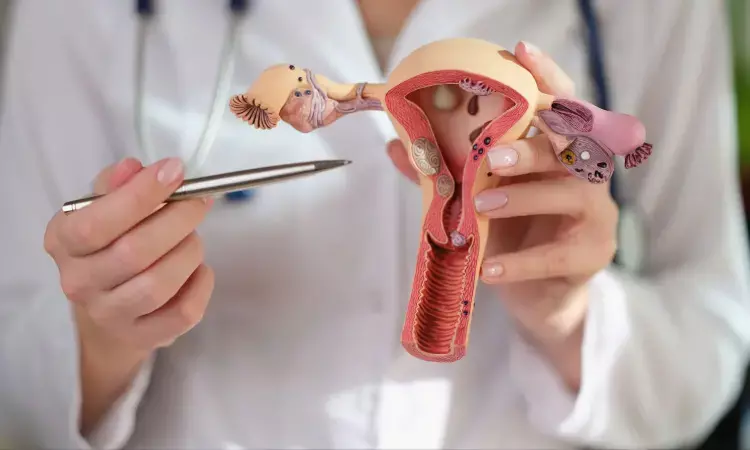- Home
- Medical news & Guidelines
- Anesthesiology
- Cardiology and CTVS
- Critical Care
- Dentistry
- Dermatology
- Diabetes and Endocrinology
- ENT
- Gastroenterology
- Medicine
- Nephrology
- Neurology
- Obstretics-Gynaecology
- Oncology
- Ophthalmology
- Orthopaedics
- Pediatrics-Neonatology
- Psychiatry
- Pulmonology
- Radiology
- Surgery
- Urology
- Laboratory Medicine
- Diet
- Nursing
- Paramedical
- Physiotherapy
- Health news
- Fact Check
- Bone Health Fact Check
- Brain Health Fact Check
- Cancer Related Fact Check
- Child Care Fact Check
- Dental and oral health fact check
- Diabetes and metabolic health fact check
- Diet and Nutrition Fact Check
- Eye and ENT Care Fact Check
- Fitness fact check
- Gut health fact check
- Heart health fact check
- Kidney health fact check
- Medical education fact check
- Men's health fact check
- Respiratory fact check
- Skin and hair care fact check
- Vaccine and Immunization fact check
- Women's health fact check
- AYUSH
- State News
- Andaman and Nicobar Islands
- Andhra Pradesh
- Arunachal Pradesh
- Assam
- Bihar
- Chandigarh
- Chattisgarh
- Dadra and Nagar Haveli
- Daman and Diu
- Delhi
- Goa
- Gujarat
- Haryana
- Himachal Pradesh
- Jammu & Kashmir
- Jharkhand
- Karnataka
- Kerala
- Ladakh
- Lakshadweep
- Madhya Pradesh
- Maharashtra
- Manipur
- Meghalaya
- Mizoram
- Nagaland
- Odisha
- Puducherry
- Punjab
- Rajasthan
- Sikkim
- Tamil Nadu
- Telangana
- Tripura
- Uttar Pradesh
- Uttrakhand
- West Bengal
- Medical Education
- Industry
Endometrial ablation increases risk of hysterectomy upto 12 % after five years

A systemic review and meta-analysis on "Risk of Hysterectomy After Endometrial Ablation" by Oderkerk et al. have concluded that hysterectomy risk following endometrial ablation increases from 4.3% to 12.4% after one year and five years, respectively. This aspect should be considered in counselling patients regarding the risk of hysterectomy after endometrial ablation.
In this study, researchers assessed hysterectomy risk after nonresectoscopic endometrial ablation in patients with a history of heavy menstrual bleeding using data from EMBASE, MEDLINE, ClinicalTrials.gov and Cochrane databases. The search terms for endometrial ablation and hysterectomy were used.
The key points of this study are:
- Fifty-three studies met inclusion and exclusion criteria.
- There were six retrospective studies, 24 randomized controlled trials, and 23 prospective studies.
- A total of 48,071 patients underwent endometrial ablation between 1992 and 2017.
- The Follow-up duration varied between 12 and 120 months.
- At 12 months of follow-up, there was a 4.3% hysterectomy rate.
- At 18 months, 24 months, 36 months, 48 months and 60 months, the hysterectomy rate was 11.1%, 8.0%, 10.2%, 7.6% and 12.4%, respectively.
- Two studies reported a mean hysterectomy rate of 10 years after ablation of 21.3%.
They concluded that hysterectomy risk after endometrial ablation increased from 4.3% after one year to 12.4% after five years.
This should be used to counsel patients, they wrote.
Further reading:
BDS, MDS in Periodontics and Implantology
Dr. Aditi Yadav is a BDS, MDS in Periodontics and Implantology. She has a clinical experience of 5 years as a laser dental surgeon. She also has a Diploma in clinical research and pharmacovigilance and is a Certified data scientist. She is currently working as a content developer in e-health services. Dr. Yadav has a keen interest in Medical Journalism and is actively involved in Medical Research writing.
Dr Kamal Kant Kohli-MBBS, DTCD- a chest specialist with more than 30 years of practice and a flair for writing clinical articles, Dr Kamal Kant Kohli joined Medical Dialogues as a Chief Editor of Medical News. Besides writing articles, as an editor, he proofreads and verifies all the medical content published on Medical Dialogues including those coming from journals, studies,medical conferences,guidelines etc. Email: drkohli@medicaldialogues.in. Contact no. 011-43720751


